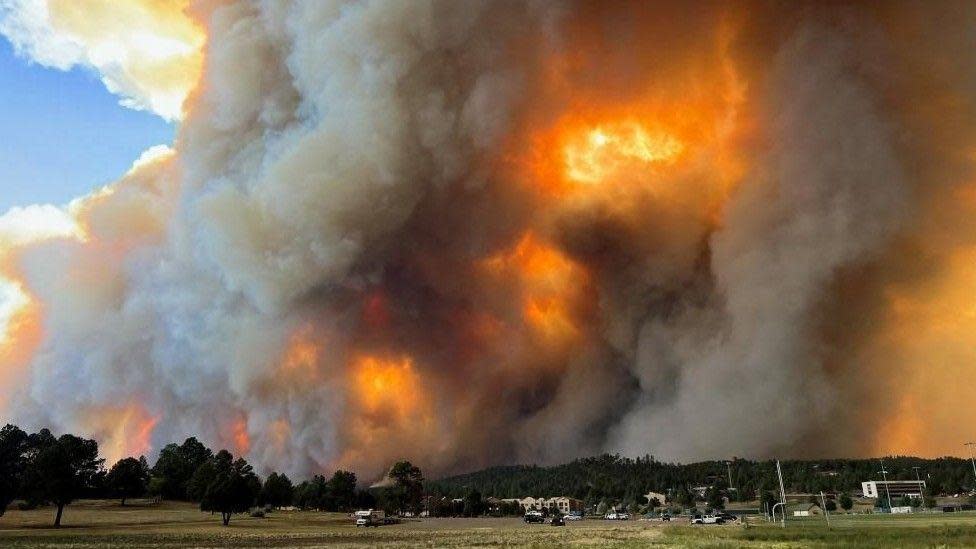Villagers 'scared to death' by New Mexico wildfires

Residents of a New Mexico village have described their panic as two wildfires swept through a mountain range - causing evacuations and two deaths.
The two blazes have converged near Ruidoso inside a tribal reservation, prompting its 7,800 residents to flee.
They are the South Fork Fire, which has burned more than 1,400 structures since it ignited on Monday, and the Salt Fire, which is raging to the south of the village.
US President Joe Biden has declared the fires a major disaster, granting local, tribal and state agencies as well as non-government agencies access to emergency federal funds from the Federal Emergency Management Agency.
The declaration also allows home and business owners who have been affected to access grants and low-cost loans to cover the costs of temporary accommodation and repairs.
Predicted cooler temperatures and rain could help mitigate the fires.
One Rudioso resident spoke of being "scared to death" on Tuesday after being engulfed in smoke.
"We have been through several fires in the 19 years we've been there, and none of it was fierce like this one,” 83-year-old Frank Loya told Reuters news agency.
The two blazes have scorched more than 20,000 acres and remain 0% contained, according a Tuesday night update from authorities.
“The horrific South Fork Fire and Salt Fire have ravaged our lands and property, and forced thousands to flee their homes,” said New Mexico Governor Michelle Lujan Grisham, who declared a state of emergency.
“We are deploying every available resource to control these fires.”
New Mexico State Police spokesperson Wilson Silver told local media that two people had died in Ruidoso.
One victim was found in a burned vehicle while the second was found on the side of a road with burn injuries, Mr Silver said.
Christy Hood, an estate agent in Ruidoso, told the Associated Press how she fled with her husband, two children and dogs without even taking clothes or a toothbrush. Locals were urged on Monday to evacuate without trying to gather belongings.
“As we were leaving, there were flames in front of me and to the side of me,” she said. “And all the animals were just running, charging, trying to get out.”
Most of the hundreds of structures destroyed were thought to be homes, said George Ducker of the New Mexico Forestry Division.
He told the BBC that both fires had spread because of dry conditions and wind, but what sparked them remained under investigation.
The fires prompted the partial closure of US Highway 70 south of the village and phone outages that have posed a challenge for emergency responders in Ruidoso.
Nearby communities have opened shelters for evacuees, and the city of Roswell has cleared hospital space for patients evacuating from the Ruidoso hospital.
Heavy rain and hail fell on Wednesday evening, causing weather authorities to issue a flash flood warning in areas where fire destroyed water-absorbing vegetation.
"Water rescues are ongoing in the Ruidoso area as flood waters surge down the slopes from nearby burn scars," the National Weather Service's office in Albuquerque posted on X.
"Folks should seek higher ground and stay away from any low-lying areas that could become flooded."
Cooler temperatures are in the local forecast for the later part of the week, potentially offering resident a reprieve from the fires. However, winds are expected to increase into Wednesday evening, potentially fuelling the blazes.
Wildfires in New Mexico are not unusual, and the fire forecast for this year predicted normal activity, Mr Ducker said.
But parts of south-eastern New Mexico are experiencing what is classified as an “exceptional drought”.
Ruidoso attracts tourists to its trails, parks and wilderness because of its proximity to the Lincoln National Forest.
In California, firefighters are battling another wildfire north of Los Angeles, where more than 15,000 acres of land has burned, and hundreds have been forced to evacuate.
The Post Fire was 39% contained as of Wednesday morning, according to the Cal Fire website.
Continent swelters under extreme heat
The wildfires come as parts of North America grapple with the first heatwave of the season.
More than 70 million Americans, about one in five people, remain under heat alerts on Wednesday. Heat alerts also apply in six Canadian provinces.
Some cities, including Chicago, have surpassed previous record high temperatures for this time of year.
Wildfires happen naturally in many parts of the world, and their overall number has decreased over the last two decades.
Scientists say extreme weather events are becoming more frequent and intense as a result of human-caused climate change, fuelled by activities like burning fossil fuels and cutting down forests.
Heatwaves have become more frequent and more intense globally since 1950, says the UN’s climate body, the Intergovernmental Panel on Climate Change (IPCC).
Such hot weather can create conditions that make wildfire spread more likely, the IPCC says, by contributing to longer droughts.


